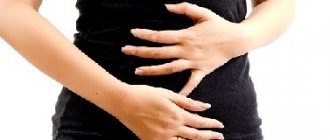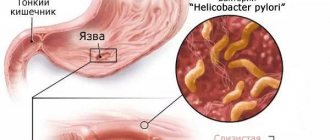Basics and types of fasting
It should be noted right away that the method of therapeutic fasting does not belong to traditional, but to alternative methods of treatment, to which the attitude in medicine is ambiguous. Some consider it quite useful for gastritis and ulcers, while others consider it to be an unnatural, “draconian” treatment method.
The method is based on the following postulates:
- allowing the digestive organs to rest;
- cleansing the body of toxins entering it with food;
- “shake-up” of the body, an attempt to force it to rebuild its metabolism, boost its protective properties and get unspent resources from the “bins”.
All this together is designed to increase metabolism, stimulate the immune system and the ability of tissues to recover, and renew the body.
There are 2 types of fasting for ulcers:
- Short-term , when a glass of water is drunk on an empty stomach, and only after 6 hours is food eaten.
- Long-term , when food is excluded for a period of 3 days to 2 weeks.
Contraindications to therapy
- purulent lesions of the gastrointestinal tract;
- body weight deficiency;
- inflammatory processes (erosive gastritis);
- esophagitis;
- children's (up to 14 years of age) and senile (after 70 years of age) age;
- pregnancy and lactation;
- the diagnosis of the disease is unclear and not established;
- "acute abdomen" syndrome;
- malignant diseases of the gastrointestinal tract;
- immobility of the patient;
- Gastrointestinal diseases are infectious in nature.
Treatment with hunger is prohibited if gastrointestinal diseases are accompanied by:
- high blood pressure;
- diabetes;
- tuberculosis, bronchitis;
- heart failure, post-infarction condition;
- diseases of the nervous system;
- diseases of the musculoskeletal system;
- allergic reactions;
- blood diseases.
Refusal of food is the only treatment method in which there is no load on the digestive organs. It is successfully used due to its effectiveness and accessibility. For short periods of time, the procedure can be carried out at home. Fasting for cleansing the gastrointestinal tract is useful; as a result of fasting and dietary therapy, a good appetite will return, pain and inflammation will disappear without the use of injections and pills.
The article was approved by the editors
What are the benefits of fasting?
Refusal of food during an ulcer for a short time can bring certain benefits if the fasting person does not suffer from other chronic diseases - heart, liver, kidneys, blood, immune system, which can worsen as a result of such a “shake-up” of the body.
Only with good protective properties, unimpaired functioning of organs and a stable neuropsychic sphere will the body be able to correctly respond to a lack of nutrition and “turn on” its internal reserves. Only in such cases will the metabolism, the work of the liver, kidneys and intestines to eliminate toxins really increase.
Rules for fasting for gastrointestinal diseases
- for diseases of the gastrointestinal tract, fasting is carried out only under the supervision of a doctor;
- short deadlines are established;
- You cannot replace water with vegetable and fruit juices;
- during the period of refusal of food, you need to move more; walks in the fresh air are recommended for at least 3 hours a day;
- Do daily enemas with a decoction of herbs: chamomile, sage, lemon balm;
- carry out hygiene procedures, limit visits to baths and saunas only;
- sleep at least 8 hours a night;
- wear clothes made from natural fibers;
- when recovering from fasting, you should consume soups and cereals;
- to refuse from bad habits.
The dangers of starvation
It must be remembered that fasting treatment is an unsafe method, which often leads to disastrous results. If it is carried out without the supervision of a doctor and not according to the plan, or exceeds the period of 10 days, or there are contraindications to it, the body begins to “revolt” and punish for a frivolous attitude towards it.
The consequences of fasting are:
- Increased feelings of hunger and thirst.
- Nausea, heartburn, when in the absence of food and excess acid, gastric juice begins to digest the gastric mucosa, this contributes to the deterioration of the course of a peptic ulcer.
- Dizziness, general weakness.
- Fall in blood pressure, cardiac weakness.
- Decreased body temperature.
- Decreased brain activity – apathy, lethargy, lethargy, slow speech.
- Pale and dry skin, brittle nails and hair.
- Susceptibility to colds, viral and other infections.
That is, fasting, like medicine, must be dosed and have its own indications and contraindications.
Pros and cons of fasting treatment
Some researchers believe that fasting treatment triggers a self-cleansing process in the body, which helps normalize the functioning of all organs and eliminate waste, toxins and other harmful substances.
When treating stomach ulcers caused by increased acidity, fasting allows you to achieve healing of damaged tissues and get rid of severe pain.
Complete refusal of food has its contraindications and negative consequences, so this procedure can only be attempted if you have received permission from a doctor.
The course of therapeutic fasting should not last more than 10 days. After this period, the body begins to “revolt”:
- nausea and dizziness appear;
- the feeling of thirst worsens, even if a person drinks enough liquid;
- temperature rises;
- the skin turns red;
- dulls hearing and vision;
- slows down brain activity;
- constant weakness is felt;
- problems appear with the formation of long statements;
- body thermoregulation is disrupted;
- painful spasms occur in the muscles;
- the body quickly loses weight;
- the condition of the skin, nails, and hair worsens;
- heart rate changes;
- there are problems with blood pressure;
- immunity is weakened, which is fraught with the development of various diseases.
The body's response to fasting depends on the individual characteristics of the human body. Some people easily tolerate this procedure and have positive results, while others suffer from unpleasant side effects.
To avoid negative consequences, fasting treatment should be carried out strictly under the supervision of a doctor.
When do doctors prescribe fasting?
In official traditional medicine there is no such method of treating ulcers as fasting. The fact is that it is dietary nutrition with frequent and split meals that helps neutralize excess acid and the enzyme pepsin. When the stomach is empty for a long time, they begin to affect the mucous membrane, only worsening its already disturbed condition.
However, fasting for ulcers is still prescribed to patients, but only in one case - when it is complicated by bleeding. The vessels located in the ulcerative defect rupture and blood flows into the stomach. Sometimes such bleeding can be very massive and severe.
Patients with a similar complication are treated in a hospital setting, usually with a surgical method - stopping bleeding endoscopically through a probe, or gastric resection surgery. For minor bleeding, they begin with conservative measures, which includes strict fasting - excluding food and even drinking for several days until the bleeding stops completely.
Therapeutic fasting for diseases of the gastrointestinal tract
Fasting, like no other method, is very suitable for treating diseases of the gastrointestinal tract. The complete absence of food gives complete rest to all digestive organs. Her body needs to secrete digestive juices, there is no need to push food through all parts of the intestines, there is no need to spend a huge amount of energy on pushing, transforming, neutralizing and eliminating all those substances that come to us with food. Now all your efforts can be directed towards your own recovery, including the restoration of the organs involved in digestion. A variety of diseases of the gastrointestinal tract, as a rule, respond very well to fasting. Here is what Yu.S. writes about this. Nikolaev: “This is especially clearly seen in the example of the treatment of peptic ulcers. Among our patients there were about 100 patients suffering from gastric or duodenal ulcers. It would be possible to give many examples of the course of this disease, but I want to limit myself to only very representative cases. Before treatment, all our patients had a symptom of the so-called “niche” during X-ray examination, i.e. X-rays revealed a deepening of the gastric or duodenal mucosa due to the presence of an ulcer. X-ray examination after the end of treatment in all cases showed the disappearance of the “niche”, i.e., it indicated the practical recovery of the patient. Patients tolerated fasting treatment, as a rule, easily; stomach pain usually stopped on the 3-5th day of fasting. On the 15-20th day, all complaints associated with peptic ulcer disappeared. Positive results can be achieved even if the disease is long-standing. We had one patient, S., 52 years old. He suffered from duodenal ulcer for 13 years. For six years in a row he was treated in sanatoriums, but the disease continued to recur. Over the past year, he was on sick leave for 120 days, of which 90 were in the hospital. Within 15 days of therapeutic fasting, the ulcer completely healed. 14 years have passed and the disease has not returned.” During therapeutic fasting, the mucous membrane of the stomach and duodenum is normalized and restored. This is manifested by a decrease and complete disappearance of pain, nausea, heartburn, and vomiting. Scarring of fresh ulcers and resorption of cicatricial changes in the walls of the stomach and duodenum occur. “As mentioned above, specialists from the Institute of Gastroenterology in Moscow discovered that in patients, as a result of 28 days of RDT, new cells with light protoplasm appear in the stomach, which, after completing the course of RDT, gradually transform over 20–30 days into additional cells. These cells secrete mucus, substances that protect the stomach from damage. After repeated courses of RDT, even gastroenterological patients’ stomachs become “tinned”, capable of digesting any food.” /Voitovich G.A./ The mucous membrane of the small and large intestines is also restored. During fasting, spontaneous bowel movements are periodically observed, in which the presence of fecal stones is noted even after the 20th day. Even those stuck-on fecal stones that cannot be cleared with any enemas are removed. During fasting, they gradually move away along with the old mucous membrane. Therefore, it is better not to do enemas during fasting, giving the colon the opportunity to rest and independently carry out all the necessary recovery procedures. This does not apply to cases when a person is just beginning to master fasting. Here enemas are simply necessary - they help remove deposits of fecal stones and facilitate fasting, reducing intoxication of the body. Fasting greatly improves liver function. It causes a mild choleretic effect and restores liver cells. Patients with cholelithiasis instinctively resort to fasting, which relieves pain and normalizes the functioning of the liver and gallbladder. Natural cleansing occurs - removal of unnecessary products, dissolution of stones.
Good results are also observed in the treatment of such a terrible disease as acute pancreatitis: “In the clinic named after. Spasokukotsky, under the leadership of Academician A. N. Bakulev, treated 275 patients with acute pancreatitis with fasting. All of them were discharged in satisfactory condition. Based on this experience, it was concluded that it is advisable to use fasting in the treatment of pancreatitis, and our method is now widely used in acute and chronic forms of this disease. To obtain a good therapeutic effect, 10-15 days of fasting are usually sufficient. The main principle of treatment for pancreatitis is to relieve the painful syndrome, eliminate shock, collapse, ensure functional rest of the pancreas, eliminate intoxication” / Yu. S. Nikolaev/. Apart from fasting, there is not a single method in which there is almost no stress on the digestive organs. Therefore, it is not surprising that it is so effective for a variety of disorders in the gastrointestinal tract. One can only be amazed at the ignorance of our medicine, which, instead of effective, fast, cheap treatment, uses expensive medications, lengthy examinations, surgical interventions, which not only do not lead to a cure for the patient, but also make him a chronic patient, living an unfulfilling life and forever tied to doctors' services. Therefore, take responsibility for your health into your own hands, start fasting and you will regain your lost appetite, excellent digestion and good, regular bowel movements.
See also: fasting for kidney disease
Is it possible to fast if you have a stomach ulcer?
The answer to the question of whether and how to fast if you have a stomach ulcer is ambiguous. The fact is that it is impossible to predict how the body of a particular person will react to the cessation of the supply of vital substances - proteins, fats, carbohydrates, vitamins and microelements.
The opinion that organs will “rest” when their owner refuses food is far from the truth. The body is an automatic system that is constantly in motion, biochemical processes are constantly occurring in organs and tissues, which are united and controlled by a single neuroendocrine system.
Further, it has been established that one of the causes of ulcers is neuropsychic stress. The feeling of hunger is inherent at the level of instincts, and its dissatisfaction leads to a stressful situation.
Another important “debunking” of the benefits of fasting for ulcers. Those who promote it claim that since food does not enter the oral cavity and stomach, it means that acid and pepsin are not produced, and this creates conditions for healing. Actually this is not true. The secretion of gastric juice occurs automatically and constantly, making it “understand” that the body needs to eat in order to live.
We must not forget that the digestion process is regulated by the cerebral cortex, and various associations associated with food intake can arise in it. For example, just the memory of a favorite dish, and even on an empty stomach, is a powerful stimulus for the production of acid, which means an exacerbation of the ulcer and increased pain.
When can fasting be useful?
In rare cases, peptic ulcers appear as a result of increased acidity of gastric juice. In such a situation, short-term fasting can give a positive result.
Is it possible to fast sometimes if you have a stomach ulcer? It has been proven that with a 3-4 day refusal of food, the stomach stops producing acid, and this contributes to scarring of damaged tissues and the disease going into remission.
But fighting an ulcer cannot be called a medical procedure. This is due to the fact that increased stomach acidity is the result of a malfunction in the body, the cause of which must be sought by a qualified specialist. Fasting for ulcers helps to cope with symptoms, but does not eliminate the causes of the disease, so there remains the possibility of relapse.
But if the onset of the disease is provoked by other factors, refusal to eat food will not be cured; it can even be dangerous for a person.
Nutrition for stomach ulcers
Therapeutic nutrition for stomach ulcers is an excellent alternative to fasting, proven by many years of practice, which cannot always be called therapeutic. There is a diet established by world dietetics and gastroenterology, which is based on the following basic principles:
- Do not overload the stomach and do not leave it empty for a long time, that is, meals should be small and frequent - up to 5-6 times a day, with a small amount of food.
- Eat food at certain times, because the stomach develops a reflex to increase secretion at certain times.
- Food should have a temperature close to body temperature (35-40°), neither cold nor hot.
- In terms of composition, the diet should contain a sufficient amount of easily digestible protein, carbohydrates, healthy fats with essential fatty acids, and vitamins.
- Food should not injure the mucous membrane: not coarse, well processed, not hard, not too salty, and not contain preservatives or hot seasonings.
- Drinks should not contain carbon dioxide (gas), alcohol, high caffeine content, dyes, or preservatives.
The specialist will always give detailed dietary recommendations to each patient, taking into account the nature of the ulcerative process and its stage.
Advice and reality
The Internet is full of advice on how you can cure stomach and duodenal ulcers with the help of fasting, they are motivated by the fact that “the less the wound is disturbed, the faster it will heal.” But it is not so. The stomach is designed for digestion and almost constantly secretes hydrochloric acid, enzymes on the one hand, and mucus, as a factor protecting the mucous membrane from damage ─ on the other.
For stomach ulcers, split meals are prescribed in small portions and strict adherence to the diet. With this, doctors pursue several goals at once, namely:
- the stomach “gets used” to secrete hydrochloric acid and enzymes at a certain time of day, when the next portion of food enters it. The rest of the time the level of secretion is low;
- Frequent meals help maintain the acidity in the stomach at the same level.
Advice from a gastroenterologist
What is the opinion of gastroenterologists regarding therapeutic fasting for gastric and duodenal ulcers? Most of them are inclined to believe that fasting with such a pathology, especially during its exacerbation, is dangerous. And fasting, which is used as self-medication without the knowledge of a doctor, is generally unacceptable.
Dietary nutrition is fundamental for ulcers. And for those who believe in fasting, it is possible in a short-term form, but only if a specialist gives the go-ahead to it after examining the patient.
What is a stomach ulcer
Peptic ulcer is a chronic disease that violates the integrity of the mucous membrane (in rare cases, submucosal) of the stomach.
Due to the action of bile and hydrochloric acid, it provokes the development of a defect in the walls of the organ. The ulcer is characterized by the fact that it does not manifest itself for a long time, that is, it is in a state of remission. But under the influence of various external and internal reasons, it can suddenly go into the stage of exacerbation. The deterioration of the patient's condition usually occurs in the spring or autumn. The development of gastric ulcers can be triggered by various factors:
- Infection with spiral shaped bacteria.
- Taking medications, mainly anti-inflammatory.
- The presence of chronic diseases that can lead to complications (syphilis, tuberculosis, pancreatitis, liver cirrhosis, diabetes mellitus).
- Nervous shock, depression and other psychological reasons.
- Addiction to alcohol and tobacco products.
- Incorrect, irregular nutrition.
- Burns, frostbite, serious injuries and other injuries that put the body in a state of stress.
Therapeutic fasting for various forms of gastritis
In case of acute inflammation of the stomach and in the active stage of the chronic process, complete fasting is necessary. It is usually prescribed for 1-3 days, depending on the severity of symptoms and the speed of their regression.
During this period, you are only allowed to drink still water and drug treatment is carried out at the same time. After the condition has stabilized, vegetable purees, mucous soups, and jelly are introduced into the diet. The diet is expanding gradually.
In case of chronic hyperacid and erosive gastritis, long-term fasting is contraindicated. This is due to the corrosive effect of hydrochloric acid on the mucous membrane. If, with gastritis with high acidity, food does not enter the stomach, then it begins to digest its own walls.










